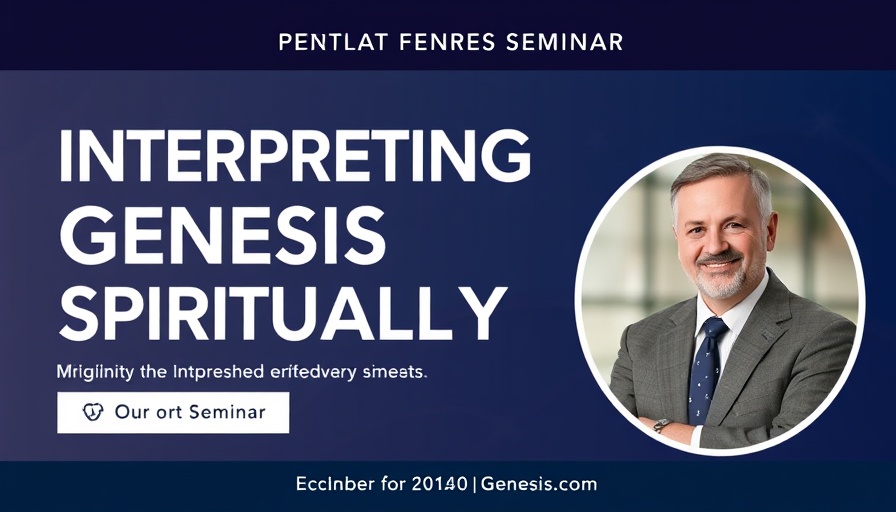
Exploring the Depths of Genesis: A New Perspective
In the context of the Seventh-day Adventist (SDA) faith community, discussions around the biblical book of Genesis often evoke a variety of interpretations, reflecting diverse theological perspectives. Laurence Turner’s insights on 'Holy Time and Holy Space' offer an intriguing alternative to a literal reading of the text. By stepping back from a rigid literalism, Turner invites believers to explore deeper meanings within the narratives that define not just their faith but also their understanding of existence itself.
Holy Time: The Significance of Understanding God’s Timing
Turner argues that interpreting Genesis through a lens that transcends literalism can enhance understanding of 'holy time.' This perspective prompts us to question what it means to align with divine moments rather than linear history. "Time in Genesis is not just about chronology; it’s about the divine encounter," he suggests. When members of the SDA faith engage this concept, it becomes evident that every moment can hold profound spiritual significance, allowing individuals to cultivate a deeper relationship with God.
Holy Space: The Dynamics of Sacred Locations in Genesis
Similar to holy time, 'holy space' in Genesis opens avenues for understanding the physical and spiritual nexus where God interacts with humanity. Locations such as Eden carry profound symbolic weight. Understanding them as more than just geographical points encourages believers to reflect on their own spaces of spiritual growth, retreat, and revelation. For the SDA community, recognizing these sacred spaces can foster deeper communal experiences during worship and fellowship.
Engaging the Faith Community: Why This Matters for SDA Members
The conversation surrounding the interpretation of Genesis has broader implications for the SDA community. By adopting a nuanced lens, members can foster a dialogue that respects tradition while also embracing contemporary understandings of faith. This can enrich communal worship and personal belief systems by allowing room for questions and exploration, rather than enforcing dogma. In a rapidly changing world, Turner’s insights may provide pathways for the SDA community to remain relevant and connected to younger generations.
Counterarguments: Addressing Concerns of Literal Interpretation
Critics of non-literal readings may argue that this approach undermines the authority of scripture. However, honoring the text’s complexity and its capacity to address human experiences does not dilute its significance. Instead, it can lead to a more engaged and vibrant faith life. Members of the SDA community can find value in honoring both foundational beliefs and the evolving understandings of faith that a deeper examination of texts can provide.
Future Trends: The Evolving Narrative of Biblical Interpretation
As the SDA community continues to navigate modern challenges, revisiting the interpretations of foundational texts like Genesis will likely play a critical role in shaping faith practices. Emphasizing dialogue over dogma could invigorate spiritual discussions. By encouraging critical thought and allowing diverse perspectives, the church could cultivate a culture of learning and adaptation, essential for thriving in a multicultural world.
Conclusion: Embracing a New Lens on Scripture
In sum, Laurens Turner’s reflections on 'Holy Time and Holy Space' invite the Seventh-day Adventist community to revisit Genesis with fresh eyes. By not reading the text literally, but instead engaging with it as a living dialogue, members can discover a vibrant tapestry of meaning that resonates with their own lives and faith journeys. The narratives not only remain relevant but become instrumental in providing spiritual insight in today’s world. Engaging in this exploration may inspire a dynamic, inclusive faith that honors tradition while embracing the future.
 Add Row
Add Row  Add
Add 




Write A Comment